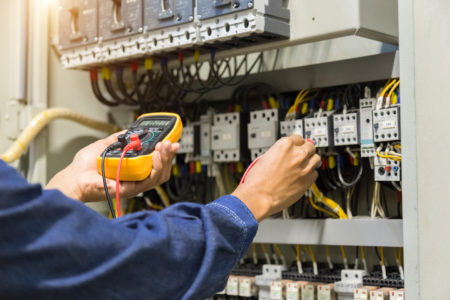Types of Protective Relay Testing and Commissioning
Filed under: Uncategorized
Comments: None
Protective relays are fault detection devices used extensively across the power system. A relay senses faults by using current and voltage sensors to remove any element from service that allows a short circuit to operate abnormally or poses a risk to the operation of the system. The protective relays work with instrument transformers that sense power conditions and circuit breaks capable of eliminating or minimizing the fault.
A relay provides unsurpassed reliability and extended capabilities at a reasonable cost. However, this equipment is subject to wear and tear and aging, making its characteristics likely to change. Therefore, it is essential to keep up with the testing and commissioning requirements. Below, the experts at North Central Electric highlight the types of relay testing and commissioning and how our team can help your facility.
Understanding Different Types of Tests
Timely protective relay testing and maintenance checks can often detect faults and degradation in service before they occur. Due to the vital role of relays in the power system, they should be tested before being placed in service and periodically after to ensure complete reliability and performance. In a typical industrial environment, testing should be done at least every two years following NFPA 70B. Protective relay testing is usually divided into three categories: acceptance testing, commissioning, and maintenance testing.
- Acceptance or evaluation testing determines whether a relay is appropriate for use on a specific protection application within a power system. During this testing, technicians can evaluate and validate the relay’s manufacturer’s specifications.
- Commission testing confirms the correct functionality of the relay when it is first placed and activated within the power system.
- Maintenance testing habitually checks and validates the proper operation of an already installed and active relay.
How Relay Testing and Commissioning Is Done
To ensure proper function, a good set of testing equipment and relay tools need to be utilized. At North Central Electric, our team uses manufacturer-produced portable relay tests, which provide us with highly accurate and reliable test results. Testing begins with a thorough visual and mechanical inspection and then progresses to functional and operational tests.
- Visual Inspection – Technicians look for excessive dust, dirt, or metallic material deposited on the cover before it is removed. With these materials present, it signals the need for air filtering at the station. Technicians will also check for loose connections, broken studs, burned installation, and dirty contacts. The visual check is essential in revealing valuable information and can prevent possible issues before taking the relay cover off.
- Mechanical Inspection – During the mechanical inspection, technicians will check connections and ensure they are tight. All gaps should be free of foreign material and moving gaps should be measured. Those values should then be compared with previous testing measurements. If the technician finds faults with any of these components, parts should be replaced.
- Electrical Type Protection Relay Testing – During an operational test, the protection relay and all the equipment compromising the protection system get tested. This can include master trip relays, supervision relays, or auxiliary relays. Functional or operational tests include applying appropriate inputs to the relay and measuring the performance to determine if it meets requirements.
- Periodic Maintenance Tests – Regular maintenance testing ensures the protection system continues to function properly for years after installation. As we stated above, all equipment is subject to wear and tear and aging, so routine testing is critical in preventing maloperation.
Protective Relay Testing and Commissioning With North Central Electric
If you are interested in extending the life of your equipment, it is vital to perform these tests on new and aging equipment to ensure they are installed and functioning correctly. With NCE services, we can increase job site safety and save your business money through our relay testing and commissioning. When you partner with us, you can ensure your electrical equipment meets industry and manufacturer standards and prove all protection controls and SCADA systems are operating as per engineered design.
